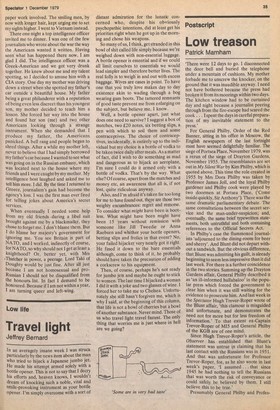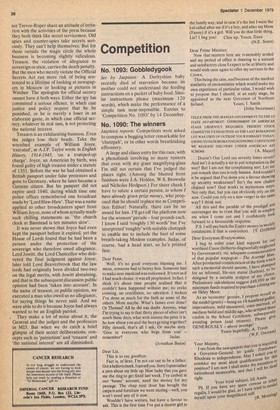Postscript
Low treason
Patrick Marnham
'There were 12 days to go. I disconnected the door bell and buried the telephone under a mountain of cushions. My mother forbade me to unscrew the knocker, on the ground that it was inaudible anyway. I need not have bothered because the press had broken it from its moorings within two days. The kitchen window had to be curtained day and night because a journalist peering through from the fire-escape had scared the cook. . . I spent the days in careful preparation of my inevitable statement to the press.'
For General Philby, Order of the Red Banner, sitting in his office in Moscow, the English newspapers of the last fortnight must have seemed delightfully familiar. The siege of Portsea Place, November 1979, was a rerun of the siege of Drayton Gardens, November 1955. The resemblances are set out in My Silent War by Kim Philby, which is quoted above. This time the role created in 1955 by Mrs Dora Philby was taken by Professor James Joll, and the loyal Philby gardener and Philby cook were played by two doormen at Portsea Place. (`Come inside quickly, Sir Anthony'). There was the same dramatic parliamentary debate. The same consultations between the secret service and the man-under-suspicion; and, eventually, the same brief typewritten statements, both untruthful and both containing references to the Official Secrets Act.
In Philby's case the flummoxed journalists 'adjourned to the dining-room for beer and sherry'. And Blunt did not depart without a sandwich, But the obvious difference, that Blunt was admitting his guilt, is already beginning to seem less impressive than it did last week. For there is a further coincidence in the two stories. Summing up the Drayton Gardens affair, General Philby described it as 'an ill-informed hullabaloo' in the popular press which forced the government to clear him when it was still waiting for the evidence to prosecute him. And last week in the Spectator Hugh Trevor-Roper wrote of the Blunt affair, 'this clamour is misguided and unfortunate, and demonstrates the need not for more but for less freedom of information.' To that extent ex-Captain Trevor-Roper of MI5 and General Philby of the KGB are of one mind.
Since Hugh Trevor-Roper's article, the Observer has established that Blunt's statement was untrue in claiming that his last contact with the Russians was in 1951. And that was unfortunate for Professor Trevor-Roper, for, as he also wrote in last week's paper, 'I assumed. . . that since 1945 he had nothing to tell the Russians that was worth the risk of conveyance or could safely be believed by them. I still believe this to be true.'
Presumably General Philby and Profes sor Trevor-Roper share an attitude of irritation with the activities of the press because they both think like secret servicemen. Old spies and counter-spies take secrets seriously. They can't help themselves. But for those outside the magic circle the whole business is becoming slightly ridiculous. Treason, the violation of allegiance to sovereign or state, carries the death penalty. But the men who merely violate the Official Secrets Act run more risk of being sentenced to a lifetime of looking at newspapers in Moscow or looking at pictures in Windsor. The apologists for official secrecy cannot have it both ways. Either the spy has committed a serious offence, in which case justice and policy require that he be punished, or he is merely a loser in an elaborate game, in which case official secrecy, whatever its real uses, is not protecting the national interest.
Treason is an exhilarating business. Even the judges lose their heads. Take the wretched example of William Joyce, 'executed', as A.J.P. Taylor wrote in English History, 1914-1945, 'on a trumped-up charge'. Joyce, an American by birth, was found guilty of high treason under a statute of 1351. Before the war he had obtained a British passport under false pretences and gone to Germany, where he later became a German citizen. But his passport did not expire until 1940, during which time one police officer remembered one broadcast made by 'Lord Haw-Haw'. That was a name applied to other broadcasters apart from William Joyce, none of whom actually made such chilling statements as, 'the church clock at Banstead is ten minutes slow'.
It was never shown that Joyce had even kept the passport before it expired, yet the House of Lords found that he had been a person under the protection of the sovereign who therefore owed allegiance. Lord Jowitt, the Lord Chancellor who delivered the final judgment against Joyce, later told Lord Beaverbrook that the law lords had originally been divided two-two on the legal merits, with Jowitt abstaining, and that in the subsequent discussion public opinion had been 'taken into account'. In the name of treason, or public opinion, we executed a man who owed us no allegiance, for saying things he never said. And we were able to do it because Joyce had always wanted to be an English patriot.
, They make a lot of noise about it, the General and the judges and the professors in MI5. But when we do catch a brief glimpse of their secret deliberations, concepts such as 'patriotism' and 'treason' and 'the national interest' are all diminished.












































 Previous page
Previous page